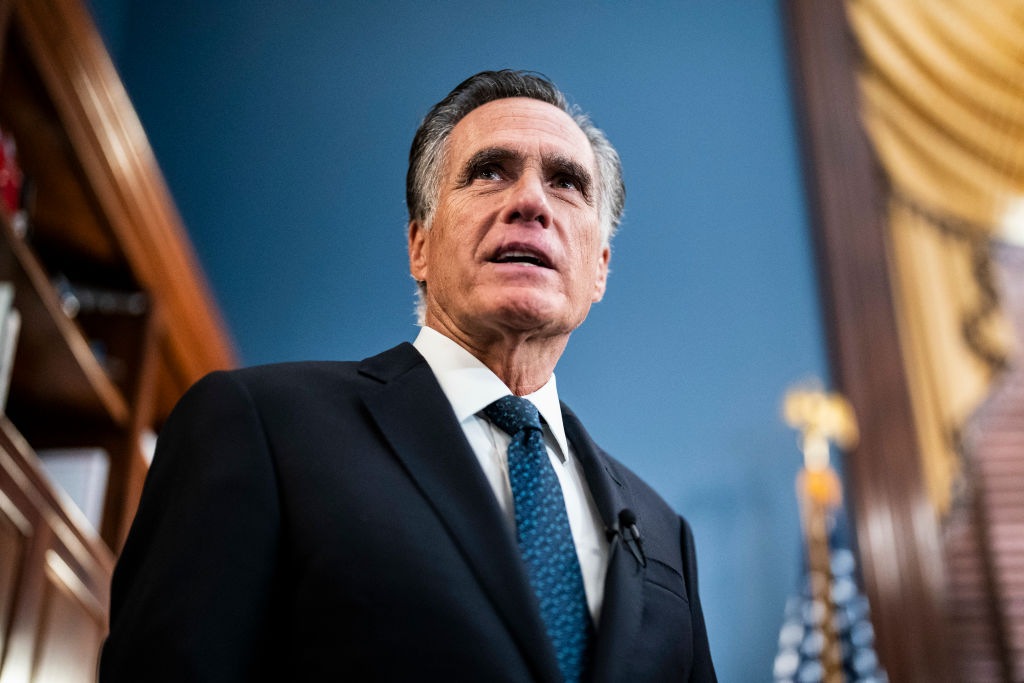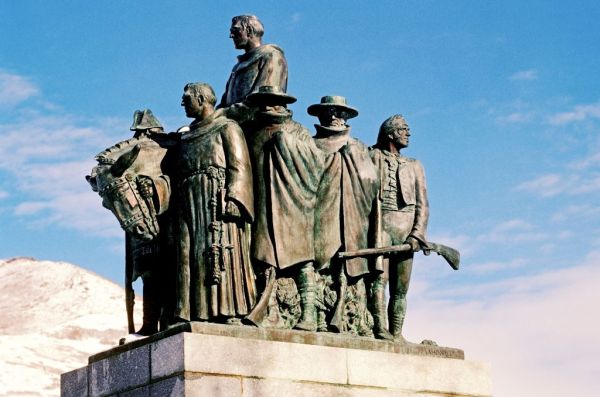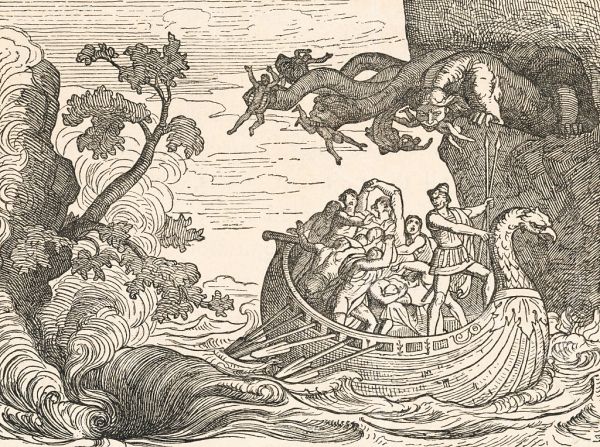Mitt Romney has been regarded as weird for much of his political life, often derided for the things he holds closest to his heart. His big Latter-day Saint family was slammed as too big. His faith was panned as “odd” or “sinister.” His love for his country, as evidenced by an impromptu a capella rendition of “America the Beautiful” on the campaign stump, was deemed as, well, awkward.
Romney himself seems exasperated by this. “I was accused of being inauthentic,” Romney told his biographer, McKay Coppins, as quoted in Romney: A Reckoning. “But in reality, that’s just who I am. I’m the authentic person who seems inauthentic.”
Last week, as Romney delivered his final address on the U.S. Senate floor, he offered a final dose of authenticity, wrapped in both his faith and his love of country. “It is customary to end remarks like these with the words: ‘God Bless America,’” Romney said. That has never seemed “jarring” or “out of place,” he noted, “because Americans have always been fundamentally good.” But Romney fears that may not always be the case: “There are some today who would tear at our unity, who would replace love with hate, who deride our foundation of virtue, or who debase the values upon which the blessings of heaven depend.” That worries Romney, because a prosperous America must be a righteous America. “For it is only if the American people merit His benevolence that God will continue to bless America,” he declared,
Romney’s theologizing, as Religion News Service’s Jack Jenkins noted, is “simultaneously not that uncommon” yet “a bit unusual for an elected official to layer into a speech.” Even so, the premise at the heart of Romney’s assertion—that America must be good to merit God’s blessing—is a sharp deviation from the Christian nationalism percolating on the American political right. And yet, in keeping with Romney’s beliefs throughout his career, the idea is unapologetically, quirkily Mormon.
That the Church of Jesus Christ of Latter-day Saints would maintain a uniquely American theology is not surprising. Latter-day Saints leaders and scripture have emphasized the centrality of America in God’s plan since the church’s founding in the early 1800s. The Book of Mormon, the faith’s central scriptural tome, teaches that the American continent was kept hidden until God “wrought upon” explorers who led them there. Modern church leaders, recognized as prophets to the faithful, have declared that God helped the colonies win the American Revolution; that the U.S. Constitution was “divinely inspired”; and that the Constitution enabled a climate of religious freedom necessary for Christ’s restored church to be established in the 19th century.
The idea that America is blessed by God only if its people are righteous is repeated throughout the Book of Mormon. The book tells of a group of Jews who, six centuries before Christ’s birth, spread across the American continent and awaited the Messiah’s coming. The land on which they dwell is a “land of promise,” they are told; the land “shall be a land of liberty unto the Gentiles, and there shall be no kings upon the land.”
In offering them this promised land, God enters a covenant with them: He will bless them as they are righteous. “Wherefore, this land is consecrated unto him whom he shall bring,” a Book of Mormon prophet, Lehi, teaches. “And if it so be that they shall serve him according to the commandments which he hath given, it shall be a land of liberty unto them; wherefore, they shall never be brought down into captivity; if so, it shall be because of iniquity; for if iniquity shall abound cursed shall be the land for their sakes, but unto the righteous it shall be blessed forever.”
Throughout the Book of Mormon, God continually promises that the American peoples will “prosper in the land” so long as they “keep the commandments.” The conditional promise is repeated throughout the book—76 times in all. The book’s final author, Moroni, believed by Latter-day Saints to be writing four centuries after Christ’s death, declared the covenant still in effect for whatever nations settled on the American continent: “And now,” warned Moroni, “we can behold the decrees of God concerning this land, that it is a land of promise; and whatsoever nation shall possess it shall serve God, or they shall be swept off when the fulness of his wrath shall come upon them.” God’s wrath will come, he continues, “when they are ripened in iniquity.”
This theology—and Romney’s contemporary interpretation of it—differs from Christian nationalist ideas in two major ways. First, Romney declares God’s favor upon the American people conditional upon their righteousness. Unlike those who declare God has irrevocably chosen America as His chosen nation, Romney notes that God’s blessing comes only to those who are morally upright.
And second, Romney recognizes that “moral uprightness” does not equate to Christianity alone. Romney specifically praised religious liberty for all as a central tenet of the American promise: “We have respected different faiths, as our first president confirmed to Muslims and Jews,” he said. Being a moral nation, Romney implies, does not mean being a Christian nation—nor does it even necessarily mean being religious—so much as it is “rush[ing] to help neighbors in need” and “welcom[ing] the poor, the huddled masses yearning to breathe free.” (Romney’s recognition of an embrace of immigration as part of moral uprightness also squares with Latter-day Saint theology, as I wrote here.)
Romney’s theological claim can be succinctly summarized by the phrase credited to Alexis de Tocqueville: “America is great because America is good. If America ever ceases to be good, she will cease to be great.” The problem is that de Tocqueville never said or wrote such a thing. Romney’s first cousin once-removed, though, said something very similar. “Can we maintain our basic freedoms, peace, and prosperity for another 200 years?” Marion G. Romney, a Latter-day Saints apostle, said in 1975. “The answer to this question is yes, if we shall individually repent and conform to the laws of the God of this land, who is Jesus Christ.”
The “basics” of those laws is this, Marion G. Romney explained: “Thou shalt love the Lord thy God … and thou shalt love thy neighbour as thyself.”






Please note that we at The Dispatch hold ourselves, our work, and our commenters to a higher standard than other places on the internet. We welcome comments that foster genuine debate or discussion—including comments critical of us or our work—but responses that include ad hominem attacks on fellow Dispatch members or are intended to stoke fear and anger may be moderated.
With your membership, you only have the ability to comment on The Morning Dispatch articles. Consider upgrading to join the conversation everywhere.